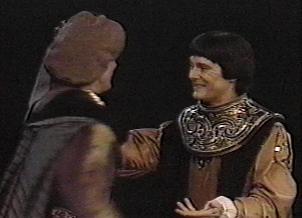
J. Kenneth Campbell as Macduff, left, and John Vickery as Malcolm, right.
screencapture by Bamfer
The Associated Press
January 24, 1981
 J. Kenneth Campbell as Macduff, left, and John Vickery as Malcolm, right. screencapture by Bamfer | John Vickery was very good as the king's son, Malcolm, believable both when he enumerates his vices for Macduff and when he tells Macduff the vices were made up to test him. J. Kenneth Campbell, as Macduff, also was good, making the scene between the two of them positively sing. |